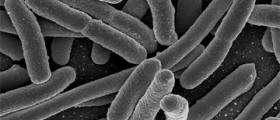
E.coli or Escherichia coli is a Gran-negative bacterium, a common culprit of many infections in humans. Even though there are many types of the bacterium, some of them can be quite dangerous for people. For instance, some of them may be responsible for bloody diarrhea. These bacteria are known as enterohemorrhagic E.coli. Apart from the mentioned some people may contract other types of E.coli capable of causing urinary tract infections or infections of other organs/organ systems. E. coli O157:H7 is particularly aggressive bacteria causing severe intestinal infection.
Contracting E.coli
In order to contract E.coli one must come in a contact with the infected stool of either humans or animals. The contact does not have to be direct. In fact, it is most commonly indirect, when the stool contaminates water or food.
Food contamination with E.coli most commonly takes place during food processing. This is how meat usually gets contaminated. If such meat is not treated with high temperatures while being prepared (temperatures of at least 160°F), the infection can be easily transmitted. Any other food that has been in a close contact with primary contaminated food is at risk of becoming contagious as well. Apart from meat E.coli may contaminate milk and dairy products as well as raw fruits and vegetables.
Water contamination takes place when animal or human feces get into sources of water used by humans (e.g. lakes, pools etc). Furthermore, if water used for drinking is not properly treated with chlorine and has come in contact with feces containing the bacterium this also leads to contamination and potential further spread of the infection.
There is also a chance for the infection to spread between people. Namely, infected individuals may spread the bacterium after bowel movements if they touch some object with their hands which they have not washed.
Symptoms and Signs of E.coli Intestinal Infection
The infection typically leads to bloody diarrhea, stomach cramps and nausea accompanied by vomiting. These symptoms develop after 3-4 days of incubation. The infection may also be completely asymptomatic, when people are carriers of the bacterium but does not develop symptoms of the disease. The infection is more likely to affect children.
Unfortunately, the infection may cause some complications such as kidney problems.
E.coli Intestinal Infection Treatment
E.coli infection mostly clears on its own. One is supposed to keep the body hydrated by taking sips of water, this way substitute for fluids loss caused by diarrhea. Dehydration mostly affects children and older adults.
More complex cases, when one develops complications with the blood or kidneys, require hospitalization and adequate treatment such as blood transfusions or even dialysis.Prevention
The infection can be prevented with certain measures. For instance, meat of any kind (especially ground beef) should be cooked to at least 160°F. Furthermore, all the kitchen surface and tools must be thoroughly washed after being in contact with raw meat. Milk, dairy products as well as juice products are supposed to be used only if they have been previously pasteurized. Drinking water is allowed only after proper chlorine disinfection. And finally, by maintaining proper hand hygiene, particularly after using the bathroom or changing diapers, one may prevent infection from being spread or contracted.

















Your thoughts on this
Loading...